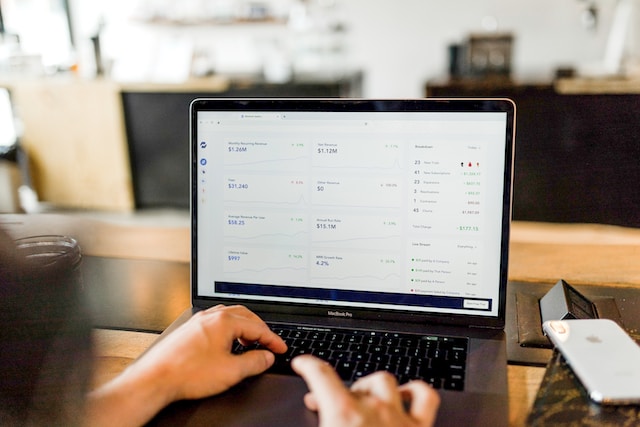What is a PPC Service?
As businesses strive to establish a dominant online presence, understanding the intricacies of PPC services is ever more important. This guide delves deep into the multifaceted services offered by PPC agencies, including the fundamentals of each and how they are interconnected.
From the art and science of crafting compelling ad copy to the nuances of designing optimised landing pages, we've got you covered. But it doesn't stop there. The journey of a successful PPC campaign is incomplete without robust tracking and analytics, ensuring every click counts and every dollar is well-spent.
Whether you're a seasoned marketer or a business owner looking to dip your toes into the PPC waters, this comprehensive guide will equip you with the knowledge and insights you need to navigate the PPC landscape with confidence. Dive in and discover the power of precision-targeted advertising.
What is B2B PPC?

B2B PPC, or Business-to-Business Pay-Per-Click, involves businesses advertising to other businesses using an online model where they pay for each ad click.
Unlike B2C (Business-to-Consumer) PPC, B2B PPC comes with unique characteristics such as a longer sales cycle, industry-specific keywords, higher cost-per-click, and a content strategy that's more educational, featuring resources like webinars and whitepapers.
Choosing the right platform for B2B PPC depends on understanding your target audience, product or service alignment, and campaign objectives. Some popular platforms include Google Ads, LinkedIn Ads, Bing Ads, and Quora.
B2B PPC's importance lies in its ability to yield immediate results, precise targeting capabilities, budget control, detailed performance analytics, adaptability, and potential for high-quality connections.
B2B PPC Strategy

PPC offers immense value to both B2C and B2B businesses, but the latter demands a unique approach due to its distinct buying cycles, complex product offerings, and decision-making processes involving multiple departments and stakeholders. For B2B PPC campaigns to be effective, it's crucial to consider several core elements.
- Keyword research should encompass both short and long-tail terms, incorporating tools like Google's Keyword Planner and Semrush.
- Landing pages need optimisation with concise copy, compelling CTAs, and regular A/B testing, while ad copy should align with user intent and resonate with their challenges.
- Segmenting audiences based on demographics, search behaviours, or job titles is also vital, alongside creating accurate audience personas.
- Budget and bid management should be refined using past PPC performance, with both manual and automated bidding to maximise ROI.
Furthermore, marketers should leverage advanced techniques to bolster their campaigns. Remarketing via Google Ads can help businesses stay engaged with potential clients after initial interactions.
Learn more about PPC Strategy.
PPC Keyword Research

Keyword research may not be the most glamorous marketing task, but it's crucial for a successful PPC campaign. Selecting the right keywords can lead to increased engagement, better conversion rates, and a higher ROI.
This process involves understanding the types of keywords, such as head vs. long-tail and branded vs. non-branded. Tools like Google Keyword Planner and Semrush can assist in identifying high-intent keywords, which indicate a user's readiness to convert.
PPC keyword research is essential as it connects businesses with the right audience. The keywords chosen influence the ad copy and the conversion pathway.
In a B2B context, the objective is to attract customers by showcasing the relevance of a product or service. Effective keyword research ensures ad spend is used wisely, leading to higher conversion rates by aligning with user intent.
PPC Ad Copy

Creating a high-performing PPC ad demands precision and expertise. Unlike their simple appearance, these ads require a balance of attention-grabbing content, relevance, and a persuasive call to action. Behind the best ads lies in-depth knowledge, research, and continuous refinement.
At its core, the ad copy, or the content of the advertisement, is designed to draw attention, deliver a message, and prompt user action. Crafting this copy is both art and science, intertwining persuasion with relevance to search queries.
PPC ads on platforms like Google have a character limit, challenging advertisers to be concise yet compelling. The fundamentals include drawing attention, conveying relevance, articulating brand offerings, and persuading the audience to click.
Google's criteria for ad copy length state that the headline and description should total no more than 120 characters. Besides the main ad copy, other elements like display URLs and ad extensions play a pivotal role. The display URL can be tailored for emphasis, while ad extensions provide additional info, such as promotions or site links, enhancing the ad's value.
PPC Landing Page

Landing pages are pivotal in PPC advertising, serving as the connector between clicks and conversions.
When a user clicks on an ad, they expect to be directed to a page that aligns with the ad's promise. If they're taken to an unrelated page or overloaded with information, they're likely to leave, resulting in lost conversions and wasted ad spend.
Landing pages should be designed with two primary considerations: alignment between the ad promise and the landing page content, and a distraction-free environment that focuses solely on the conversion goal.
Key elements of a high-converting landing page include compelling headlines, clear CTAs, relevant visuals, and trust indicators like testimonials or accreditations.
The design should be mobile-responsive, have a clear visual hierarchy, and utilize whitespace effectively. The copy should be concise, persuasive, and directly address the user's needs.
Learn more about PPC Landing Pages.
PPC Tracking

PPC (Pay-Per-Click) advertising is a multifaceted digital marketing channel, with numerous components that can influence campaign costs and performance. For marketers aiming to showcase a strong ROI, tracking is imperative. Proper PPC tracking provides insights into campaign performance, enabling continuous improvements and alignment with business KPIs.
Accurate PPC tracking is vital. It differentiates successful campaigns from ineffective ones. Benefits include efficient budget allocation, real-time performance insights, and maximized ROI.
Metrics to Monitor:
- Quality Score: Google's diagnostic tool ranking ad relevance.
- Ad Position: Indicates where your ad appears on search results.
- Impressions: Number of times your ad is viewed.
- Impression Share: Ratio of actual to eligible impressions.
- Click-through Rate (CTR): Ratio of ad clicks to views.
- Cost Metrics: CPC (Cost Per Conversion), CPL (Cost Per Lead), CPM (Cost Per Mille or 1,000 views).
- Conversion Rate: Ratio of users converting post-click.
- Customer Lifetime Value (CLV): Average value of a customer over time.
- Return on Ad Spend (ROAS): Profitability of PPC campaigns.
- Conversions in PPC: Conversions are specific actions users take post-ad engagement. Examples include requesting software trials, filling lead-capture forms, or booking demos. The right Call-to-Action (CTA) is crucial for conversions.
Click Tracking & User Journey: Beyond conversions, understanding user behaviour post-click provides deeper insights. Tools like hover tracking and heatmaps can reveal user engagement patterns.
Unified Tracking in Multi-device Era: With users accessing content across devices, unified tracking ensures coherent data collection. Google Analytics aids in measuring cross-device sessions.
Advanced Tracking with UTM Parameters: UTM parameters in URLs offer granular tracking within Google Analytics, detailing traffic sources, mediums, campaigns, and more.
Integration with Analytics Platforms: Merging PPC data with analytics platforms provides deeper insights and custom reporting dashboards, enhancing campaign evaluation.
In essence, effective PPC tracking is foundational for campaign success. It offers a holistic view of performance, guiding marketers in refining strategies and ensuring optimal ROI.
PPC Analytics

Treating PPC as a set-it-and-forget-it tactic is a grave error that can result in a significant waste of ad expenditure, particularly when clicks don't lead to conversions.
Establishing and regularly reviewing KPIs enables the early detection of issues, facilitating campaign tweaks based on learned insights.
PPC analysis isn't just about collecting data; it's about deriving actionable insights. Pitfalls to sidestep in PPC reporting encompass the absence of clear campaign goals, data overload, lack of commentary, an over-reliance on a singular metric, and not segmenting data by factors such as device or audience type. Such oversights hinder decision-making and hinder campaign refinement.
PPC Campaign Management

Essentially, PPC Management involves planning the right keywords, targeting your audience, budgeting, analysing performance, and optimising ads.
While the process sounds simple, it requires diligent planning, monitoring, and adjustments to be successful. Properly managed, PPC campaigns drive traffic, increase sales, and elevate brand visibility. However, inefficient management may lead to wasted funds without tangible returns.
Benefits of Effective PPC Management
Employing an adept PPC management strategy offers numerous advantages. Primarily, it allows total control over your ad budget, from minimal to grand expenses.
With PPC, every campaign facet, from click rates to conversions, can be meticulously measured, supporting data-driven decisions. This model offers unmatched flexibility; ads can be adjusted in real time based on their performance.
Moreover, PPC seamlessly complements other marketing avenues such as SEO and content marketing. Platforms like Google Ads offer comprehensive data on user behaviour, aiding in refining broader marketing strategies.
Day-to-Day PPC Management Tasks
Routine PPC management activities encompass a wide range of tasks. This includes monitoring budgets and analysing key performance metrics like Click-Through Rate (CTR), Conversion Rate, and Google Ads' Quality Score.
It's crucial to manage keywords by adding new ones, pausing underperforming ones, and updating negative keywords. A/B testing of ad copies, checking ad positions, addressing disapprovals, and competitor analysis are also vital.
Generating periodic reports helps in performance tracking, and staying abreast of platform updates ensures the utilisation of the latest best practices.
Considering a PPC Management Company?
For businesses finding PPC daunting, hiring a specialized company like Digital Media Stream can be invaluable. Such firms offer a holistic approach, from strategic planning tailored to business goals, expert execution of campaigns, and continuous optimisation, to diligent monitoring.
By partnering with a PPC expert team, businesses can anticipate informed guidance and premium advertising efforts that yield tangible results. If considering this route, it's imperative to choose a partner that aligns with your brand's vision and objectives.


